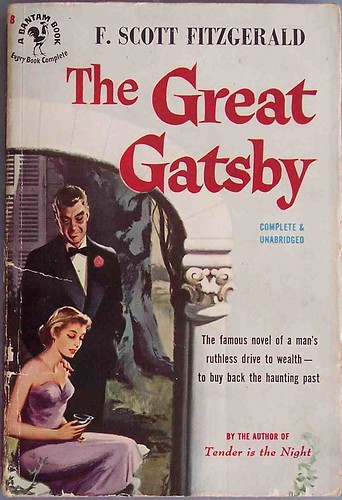Welcome to this week’s Language Blog Roundup, in which we bring you the highlights from our favorite language blogs and the latest in word news and culture.
With the premiere of the latest movie version of The Great Gatsby, the 1920s were on a lot of minds this week. The OxfordWords blog discussed the language of jazz; Ben Zimmer explained how baloney got phony; and Katy Steinmetz at Time told us why F. Scott Fitzgerald is all over the dictionary.
Author Haruki Murakami discussed translating The Great Gatsby into Japanese. Flavorwire rounded up some beautiful Great Gatsby covers, and we at Wordnik discussed the language of the 1920s beyond bee’s knees and other well-known slang.
In language news, the Washington Post announced that linguists have identified 15,000-year-old “ultraconserved’ words. Not so fast, said both Sally Thomason at Language Log and Robert Lane Greene at The Economist. Thomason explained that “word sets that have similar meanings and also sound similar after 15,000 years are unlikely to share those similar sounds as the result of inheritance from a common ancestor,” while Greene questioned the “clever statistical analysis” of the study.
In other language controversies, participants in the Scripps National Spelling Bee are now required to know the definitions of the words they’ll be spelling. Ben Zimmer took a deeper look at this rule change. Disney tried to trademark the phrase Dia de los Muertos, Day of the Dead, then decided not to, thank goodness. We also found out that we’ve been lied to all these years about the QWERTY keyboard.
In dictionary news, we were happy to learn that DARE, the Dictionary of American Regional English, has gotten a financial reprieve through a $100,000 anonymous donation and a $30,000 gift from the American Dialect Society.
At Lingua Franca, Geoff Pullum wondered why we’re still waiting for natural language processing; Lucy Ferriss discussed the possible death of LOL; Allan Metcalf visited the zoo of language pet peeves; and Ben Yagoda delved into a specific peeve, the misuse of literally.
The Atlantic had their own wordy annoyance, the overuse of definitely; The Sydney Morning Herald is “being driven mad by extraneous ‘’whats’”; and a word snob at The New York Times confessed to words both loved and hated.
At Macmillan Dictionary blog, Luke Vyner told the story behind the phrase, eye of the tiger, and Stan Carey explored LOL slash grammar. At Merriam-Webster’s blog, Emily Brewster also looked at slash as punctuation turned slang. Arika Okrent discussed some other symbols that have turned into words.
Fritinancy’s weekly words included slow TV, “television dramas whose gradual, deliberate pacing and literary structure. . . demand patience and engagement on the part of the viewer,” and, because it’s Underwear Week over at Fritinancy’s, cheekini, a style of women’s underwear with “a raised cut in the rear that covers some but not all of the buttock cheeks.”
Erin McKean’s words of the week included zhongshan, the Mao suit; uptalk, “pronouncing statements as if they were questions”; and papalo, “cilantro on steroids.” Word Spy spotted feature nail, “a fingernail with an applied color, pattern, or shape that is different from the other nails”; get-off-my-lawn, “cantankerous and old-fashioned”; and Facebook facelift, “cosmetic surgery designed to improve how a person looks in photos posted to social networking sites.”
Fully (sic) made the case for chook lit, “chick lit for the older woman,” as chook is slang for an older woman. Oz Worders explored the word shaggledick, an “affectionate term used to greet someone who is quite familiar but whose name you’ve forgotten.”
Our own words of the week included ploddledygook, promposal (also a contender for worst word of the week), and our favorite, Rikering, which must be seen to be believed.
At The Week, James Harbeck found other languages with spelling worse than that of English, and on his own blog cleared up the difference between any more and anymore. Arrant Pedantry gave the reasons the reason why is correct. Kory Stamper considered not-so-tidy parts of speech. The New Yorker explained their love of double consonants.
In library news, the Digital Public Library of America is offering 38,000 historical maps to explore, and the New York Public Library’s remodeled Donnell Library Center was unveiled this week, as well as designs for their new 53rd Street branch.
This week we learned the Isaac Newton invented a language, and how to invent a conlang, or constructed language, like Dothraki in Game of Thrones. We found out everything we need to know about Dothraki, including that we’ve been pronouncing khaleesi wrong this whole time. But so has the Game of Thrones cast with their variety of accents. On that note, we learned how to fake an accent and get away with it.
The Dialect Blog examined the poshification of David Beckham’s accent. All Voices taught us some Yorkshire. WBEZ explored the Chicago accent, Chicago “blaccent,” and differences between various African-American accents. At Johnson, Robert Lane Greene took a look at Charles Ramsey and black dialect.
We loved this piece on poets’ second jobs and this one on New York cabbie poets. You have until July 1st to submit your haiku to Mars.
In naming, we learned why NPR reporters have such great names, and a bunch of names so awful that New Zealand had to ban them. We found out that Franz Kafka was a great procrastinator; that Harper Lee is suing her literary agent for rights to To Kill a Mockingbird; and that CIA agents use pseudonyms when they review spy novels.
We loved this guide to summer movies based on books and these weird things people have said in bookstores. Finally, we weren’t sure whether to love or hate this glossary of hipster hallmarks.
That’s it for this week!
[Photo: CC BY 2.0 by Chris Drumm]
